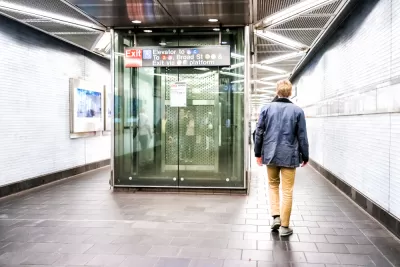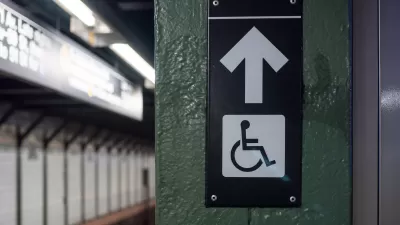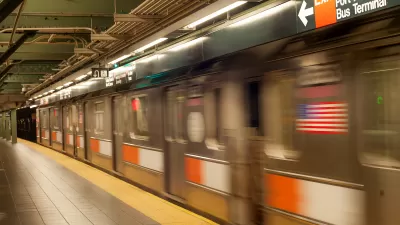The MTA announced plans for new or improved elevators at almost two dozen stations as part of its pledge to make more of its stations fully accessible.

New York’s Metropolitan Transportation Authority (MTA) announced plans to improve accessibility by installing or replacing elevators at 23 stations, acting on its pledge earlier this year to make 95 percent of its stations fully accessible by 2055 in the wake of multiple lawsuits.
As Audrey Wachs reports in The Architect’s Newspaper, “Varied station designs across the aging system make upgrades challenging, but advocates have long contended that the MTA can and should be doing more to improve accessibility: The city has one of the lowest percentages of accessible stations of any major transit system worldwide.”
The agency is entering into a public-private partnership, known as P3, to fund the work on eight stations. “Under the P3 model, the developer will partially finance the project, with equity repaid only if the elevators and other improvements are built and maintained to the MTA’s standards.”
As advocates repeatedly point out, “Accessible transit doesn’t just benefit people who use mobility aids: they also benefits seniors, caregivers lugging strollers—there are 553,000 young children in the city—visitors with heavy suitcases, and people who are just plain tired.” Moreover, accessibility includes more than just elevators and ramps. One lawsuit filed against the MTA calls on the agency to close the vertical and horizontal gaps that can pose a danger to people with mobility or visual impairments.
FULL STORY: MTA announces much-needed elevator upgrades at multiple subway and train stations

Planetizen Federal Action Tracker
A weekly monitor of how Trump’s orders and actions are impacting planners and planning in America.

Restaurant Patios Were a Pandemic Win — Why Were They so Hard to Keep?
Social distancing requirements and changes in travel patterns prompted cities to pilot new uses for street and sidewalk space. Then it got complicated.

Maui's Vacation Rental Debate Turns Ugly
Verbal attacks, misinformation campaigns and fistfights plague a high-stakes debate to convert thousands of vacation rentals into long-term housing.

Boulder Eliminates Parking Minimums Citywide
Officials estimate the cost of building a single underground parking space at up to $100,000.

Orange County, Florida Adopts Largest US “Sprawl Repair” Code
The ‘Orange Code’ seeks to rectify decades of sprawl-inducing, car-oriented development.

Maui's Vacation Rental Debate Turns Ugly
Verbal attacks, misinformation campaigns and fistfights plague a high-stakes debate to convert thousands of vacation rentals into long-term housing.
Urban Design for Planners 1: Software Tools
This six-course series explores essential urban design concepts using open source software and equips planners with the tools they need to participate fully in the urban design process.
Planning for Universal Design
Learn the tools for implementing Universal Design in planning regulations.
Heyer Gruel & Associates PA
JM Goldson LLC
Custer County Colorado
City of Camden Redevelopment Agency
City of Astoria
Transportation Research & Education Center (TREC) at Portland State University
Camden Redevelopment Agency
City of Claremont
Municipality of Princeton (NJ)





























